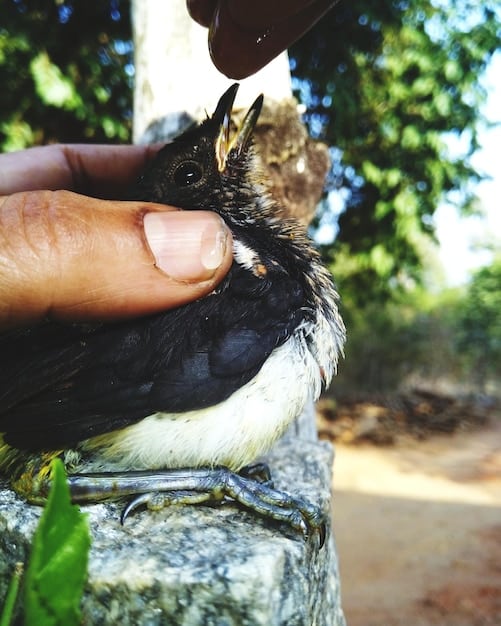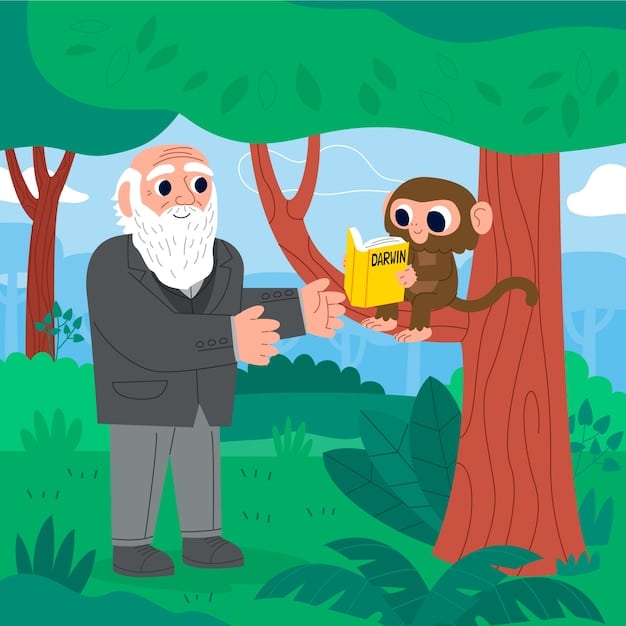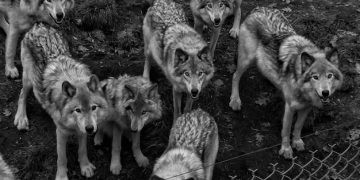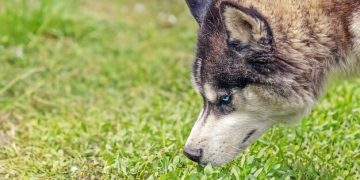Animal Cognition: Problem-Solving in Corvids & Primates

Animal cognition, particularly problem-solving, is exhibited in corvids and primates through complex behaviors, innovative tool use, and advanced social intelligence, showcasing remarkable cognitive flexibility and adaptability.
Exploring the fascinating realm of animal intelligence, this article delves into the remarkable cognitive capabilities of corvids and primates. We will examine how these species exhibit advanced problem-solving skills, adapting to challenges with creativity and complex thought processes. The field of animal cognition: exploring problem-solving abilities in corvids and primates offers insights into the evolution of intelligence and the diversity of cognitive strategies across species.
Introduction to Animal Cognition
Animal cognition encompasses the mental capacities of non-human animals, exploring how they perceive, process, and act upon information. Understanding these cognitive abilities provides valuable insights into the evolution of intelligence and behavior.
This area of study examines various aspects of animal behavior, including perception, learning, memory, and problem-solving. By studying these elements, scientists can uncover the rich cognitive lives of animals.
Defining Animal Cognition
Animal cognition can be defined as the study of the mental processes underlying animal behavior. Researchers investigate how animals acquire, store, and use information to navigate their environment and interact with others.
- Perception: How animals receive and interpret sensory information.
- Learning: The ability to acquire new skills or knowledge through experience.
- Memory: The capacity to store and retrieve information over time.
- Problem-solving: The ability to find solutions to novel challenges.
Studying animal cognition helps us appreciate the complexity and diversity of intelligence across the animal kingdom. It challenges anthropocentric views and highlights the cognitive adaptations that enable animals to thrive in their unique ecological niches.
In summary, the study of animal cognition is vital for understanding the mental lives and behaviors of animals. By exploring cognitive processes such as perception, learning, and problem-solving, we can gain profound insights into the diverse forms of intelligence found in the natural world.
Corvid Cognition: Masters of Problem-Solving

Corvids, including crows, ravens, and jays, are renowned for their remarkable cognitive abilities. Their problem-solving skills, in particular, have captured the attention of researchers and nature enthusiasts alike.
These birds display advanced cognitive traits, such as tool use, planning, and social learning, which are often compared to those of primates. Their adaptability and innovation in problem-solving highlight their exceptional intelligence.
Tool Use in Crows
One of the most striking examples of corvid cognition is their adept use of tools. New Caledonian crows are particularly famous for their ability to create and use tools to access food sources.
- Creating Tools: Crows can modify twigs and leaves to create hooked tools for extracting insects from tree trunks.
- Problem-Solving with Tools: They can use tools in a sequential manner, employing one tool to obtain another.
- Adaptability: Crows demonstrate flexibility by adapting their tool use strategies to different challenges.
Tool use in crows is not just an instinctual behavior; it involves learning, innovation, and problem-solving. Their ability to modify and use tools effectively underscores their intelligence and cognitive complexity.
Ravens are also known for their insightful problem-solving skills. Studies have shown that ravens can plan for future events and demonstrate an understanding of cause and effect. In laboratory settings, ravens have been observed solving multi-step puzzles to obtain food, showcasing their cognitive flexibility and strategic thinking.
Ultimately, corvid cognition reveals the advanced problem-solving capabilities in these intelligent birds. Their tool use, planning abilities, and understanding of cause and effect highlight their cognitive complexity and adaptability, making them a fascinating subject of study in animal behavior.
Primate Cognition: Intelligence and Social Complexity
Primates, including monkeys, apes, and humans, exhibit a wide range of cognitive abilities that are crucial for their survival and social interactions. Their intelligence is manifested in various forms, from problem-solving to social learning.
Many primate species live in complex social groups, requiring them to navigate intricate relationships and hierarchies. This social complexity has likely driven the evolution of advanced cognitive skills.
Problem-Solving in Primates
Primates are adept at solving a variety of problems, ranging from foraging for food to navigating their environment. Their problem-solving skills often involve tool use, spatial reasoning, and social learning.

- Tool Use: Chimpanzees use tools to crack nuts, extract termites, and obtain water.
- Spatial Reasoning: Primates can remember the location of food sources and navigate complex terrains.
- Social Learning: Many primates learn new skills by observing and imitating others in their group.
Chimpanzees are well known for their tool use abilities. They use stones to crack nuts, sticks to extract termites from mounds, and leaves as sponges to soak up water. Moreover, chimpanzees exhibit cultural variations in tool use, with different groups employing unique techniques and tools.
Moreover, primate cognition highlights the intelligence and social complexity of these animals. Their problem-solving skills, tool use, and advanced social cognition demonstrate their ability to adapt and thrive in diverse environments. Studying primate cognition offers insights into the evolution of intelligence and the unique cognitive adaptations that characterize different species.
In conclusion, the intelligence exhibited by primates has profound implications for their survival, social dynamics, and ecological interactions. Their capacity for problem-solving and social cognition showcases the complex cognitive abilities that have evolved to support their unique lifestyles.
Comparative Cognition: Corvids vs. Primates
Comparing the cognitive abilities of corvids and primates offers valuable insights into the evolution of intelligence. It shows that complex cognitive traits can evolve independently in different lineages.
While both groups exhibit advanced problem-solving skills, there are also notable differences in their cognitive strategies and ecological adaptations.
Similarities in Cognitive Abilities
Both corvids and primates share several cognitive traits, including tool use, problem-solving skills, and social intelligence. These similarities highlight the convergent evolution of intelligence in response to similar ecological pressures.
- Tool Use: Both groups use tools to obtain food and solve problems.
- Problem-Solving: Corvids and primates can solve complex puzzles and adapt to novel challenges.
- Social Intelligence: Both groups live in complex social groups and use social learning to acquire new skills.
Convergent evolution refers to the independent evolution of similar traits in different species. In the case of corvids and primates, their similar problem-solving abilities may reflect the challenges of surviving in complex and changing environments.
In summary, comparative cognition provides insights into the evolution of intelligence by examining similarities and differences between corvids and primates. Despite belonging to different taxonomic groups, their shared cognitive traits reveal the diverse pathways through which complex intelligence can evolve.
The Neural Basis of Cognition
Understanding the neural basis of cognition is essential for unraveling the biological mechanisms underlying intelligent behavior. Studies of brain structure and function provide insights into how cognitive processes are implemented in the nervous system.
Research into both corvid and primate brains has revealed specialized neural circuits and brain regions that support their advanced cognitive abilities.
Brain Structure and Intelligence
The size and structure of the brain are often correlated with cognitive abilities. Both corvids and primates have relatively large brains compared to their body size, suggesting a link between brain size and intelligence.
- Brain Size: Larger brain size is associated with enhanced cognitive capacity.
- Brain Structure: Specific brain regions are involved in different cognitive functions.
- Neural Circuits: Complex neural circuits support higher-level cognitive processes.
Comparative neuroanatomy studies reveal similarities and differences in the brain structures of corvids and primates. Both groups have expanded brain regions associated with learning, memory, and problem-solving. However, the specific organization and function of these regions may vary.
Overall, understanding the neural basis of cognition is critical for elucidatinghow the brain enables intelligent behavior in corvids and primates. Future research may reveal additional insights into the neural mechanisms underlying complex cognitive processes.
Environmental Factors and Cognitive Development
Environmental factors play a crucial role in shaping cognitive development in both corvids and primates. The complexity and variability of their environments can influence the emergence and refinement of cognitive abilities.
Exposure to diverse challenges and opportunities can stimulate cognitive growth and promote the development of adaptive strategies.
The Role of Environment
The environment in which an animal lives can have a profound impact on its cognitive development. Animals that live in complex and changing environments may be more likely to evolve advanced cognitive abilities.
- Environmental Complexity: Complex environments require animals to solve difficult problems.
- Social Interactions: Social learning and cooperation can promote cognitive development.
- Resource Availability: Access to diverse resources can stimulate innovation and problem-solving.
Environmental enrichment studies have shown that providing animals with stimulating environments can enhance their cognitive abilities. These studies highlight the importance of early experiences in shaping cognitive development.
In summary, environmental factors are critical for shaping cognitive development in corvids and primates. The complexity and variability of their environments can influence the emergence and refinement of cognitive abilities, highlighting the interplay between nature and nurture in the evolution of intelligence.
| Key Point | Brief Description |
|---|---|
| 🧠 Studying Cognition | Examining mental processes in animals to understand intelligence evolution. |
| 🐦 Corvids’ Skills | Crows and ravens use tools, plan ahead, and learn socially. |
| 🐒 Primates’ Intelligence | Monkeys and apes show problem-solving and social learning. |
| 🌍 Environmental Influence | Environments affect how well animals learn and adapt. |
Frequently Asked Questions (FAQ)
▼
Animal cognition is the study of mental processes in non-human animals, including perception, learning, memory, and problem-solving. It aims to understand how animals perceive, process, and act upon information.
▼
Corvids, like crows and ravens, demonstrate problem-solving through tool use, planning for future events, and social learning. New Caledonian crows are particularly known for creating and using tools to access food.
▼
Primates possess a wide range of cognitive abilities, including tool use, spatial reasoning, and social learning. They live in complex social groups, requiring them to navigate intricate relationships and hierarchies.
▼
The environment plays a crucial role in shaping cognitive development. Complex and changing environments can stimulate cognitive growth, promoting the development of adaptive strategies in animals.
▼
Comparative cognition involves comparing cognitive abilities across different species. This helps to understand the evolution of intelligence and how different groups have adapted to their unique ecological niches.
Conclusion
In conclusion, the study of animal cognition: exploring problem-solving abilities in corvids and primates provides valuable insights into the diverse forms of intelligence found in the animal kingdom. By examining the cognitive skills of these fascinating groups, we can gain a deeper understanding of the evolutionary forces that have shaped their minds and behaviors.





